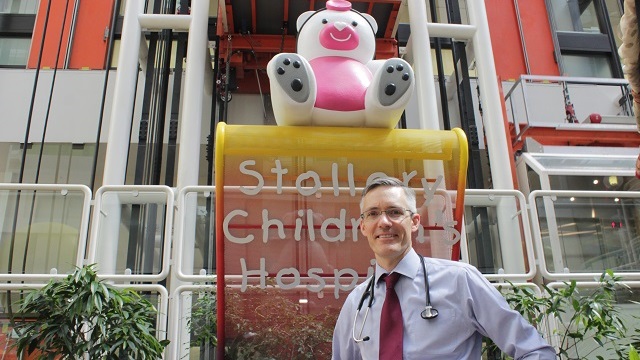
Andrew Mackie, Distinguished Researcher with the Stollery Science Lab and member of the Women and Children's Health Research Institute, is developing an app to help young adults with congenital heart disease transition more smoothly into the adult health-care system. His project was one of two U of A initiatives to receive funding from CIHR under the new Transitions in Care grant.
U of A researchers are working on a new way to help more young patients with congenital heart defects transition into the adult health system smoothly with a new smartphone app. The goal is to help young adults develop better self-management skills, and prevent them from becoming lost in the health-care system.
"In the pediatric setting, we tend to be family-focused and parents are there to advocate for their child. But in the adult system, the focus is on the patient and there's a lot less handholding," said Andrew Mackie, associate professor of cardiology in the Department of Pediatrics, Distinguished Researcher within the Stollery Science Lab and member of the Women and Children's Health Research Institute. "For young adults who grew up in the pediatric system, that change to the adult system can be a struggle, and it is a time when they can fall out of care."
Many young adults with congenital heart disease have very little knowledge about their condition, Mackie said. Often, patients who had heart surgery early in life don't understand what is required to manage their condition as they get older and become independent. Without the proper knowledge of their condition, young adults tend to not ask questions or advocate on their own behalf which can lead to lapses in care.
Living with congenital heart disease
Thanks to significant advances in medicine over the last few decades, the number of people born with heart defects surviving to adulthood has increased exponentially; according to the Heart and Stroke Foundation, 60 years ago fewer than 20 per cent of infants born with complex heart defects reached adulthood. Today, that number is more than 90 per cent.
Currently, transitioning adolescents with congenital heart defects is done through a cardiology nurse-led training session with the patient, at the end of which the patient receives a health "passport" with details about their condition and a summary of the training session. While the sessions have been very successful, they can be resource-intensive-particularly for the nurses delivering the training-and nurses able to lead the sessions are located only in major centres like Edmonton or Calgary. Mackie and his team are hoping his app can expand the success of the training sessions, and make them more efficient and accessible.
"We wanted to build something that is less costly, more accessible for patients in rural areas, and that is a long-term resource for patients," Mackie said. "Whereas the nurse-led training is one or two sessions, the app is something a patient can go back to over and over again."
According to Mackie, the first year of the four-year project will be spent developing the app. The following three years will be spent evaluating the app in comparison to the nurse-led sessions through a randomized control trial. The trial will look at user levels of heart knowledge and self-management skills, as well as a detailed cost analysis. The evaluation will include patients receiving care at five sites across Canada, including the Stollery Children's Hospital.
"A successful transition is where the patient is knowledgeable about their condition, is comfortable communicating with their providers, is knowledgeable about potential late cardiac complications, is aware of the need for lifelong follow up, and hasn't been turned off by the experience in the adult health-care system to the point they never want to return," he said. "Success also means fewer avoidable emergency room visits for patients and a more efficient use of resources overall in the health system, and we're hoping this app can contribute to those goals."
CIHR Funding
Mackie's project was one of two U of A initiatives recently awarded a grant from the Canadian Institutes of Health Research (CIHR) under a new program called Transitions In Care. Launched in 2018, the program is designed to support research and projects that look to improve transitions in care in a health-care activity, or across a health-care system. The funding was awarded in the Team Grants category, which supports interdisciplinary or multidisciplinary research teams working on putting improved transitions in care approaches into practice.
Mackie's team includes cardiologists, statisticians, health economists and young adults with congenital heart disease. The team will also work with a patient and family advisory committee in the development of the app.
In addition to funding from the CIHR grant, the project received support from Alberta Innovates and the Stollery Children's Hospital Foundation.